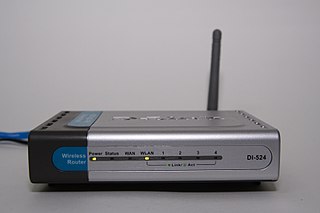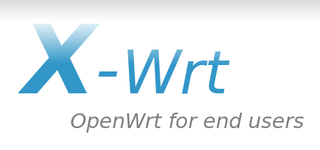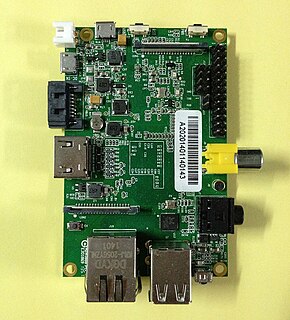
Wake-on-LAN (WoL) is an Ethernet or Token Ring computer networking standard that allows a computer to be turned on or awakened by a network message.
Smoothwall is a Linux distribution designed to be used as an open source firewall. Smoothwall is configured via a web-based GUI and requires little or no knowledge of Linux to install or use.

A wireless router is a device that performs the functions of a router and also includes the functions of a wireless access point. It is used to provide access to the Internet or a private computer network. Depending on the manufacturer and model, it can function in a wired local area network, in a wireless-only LAN, or in a mixed wired and wireless network.
The DSL-G604T is a first D-Link Wireless/ADSL router which firmware is based on open source the MontaVista Linux. The DSL-G604T was introduced in November 2004. This model has been discontinued.
40 Gigabit Ethernet (40GbE) and 100 Gigabit Ethernet (100GbE) are groups of computer networking technologies for transmitting Ethernet frames at rates of 40 and 100 gigabits per second (Gbit/s), respectively. These technologies offer significantly higher speeds than 10 Gigabit Ethernet. The technology was first defined by the IEEE 802.3ba-2010 standard and later by the 802.3bg-2011, 802.3bj-2014, 802.3bm-2015, and 802.3cd-2018 standards.
CZ.NIC is a Czech interest association of legal persons established by leading Internet service providers in 1998. The main activity of the association is administration of domain names .cz and 0.2.4.e164.arpa (ENUM), administration of .cz top-level domains and education in the area of domain names. Currently, the employees of the association are intensively working on expanding the DNSSEC technology, developing the domain administration system and mojeID service and promoting new technologies and projects beneficial to the Internet infrastructure in the Czech Republic.

Zonbu was a technology company that markets a computing platform which combines a web-centric service, a small form factor PC, and an open source based software architecture. Zonbu was founded by Alain Rossmann and Gregoire Gentil.

X-Wrt is a set of packages and patches to provide a web interface for the Linux distribution OpenWrt. It is based on haserl and has nothing to do with the X Window System. It allows web based management of an OpenWrt device. It was originally created as a package for OpenWrt White Russian. At present it can be found in the OpenWrt trunk as the webif package. Some newer features such as dual-band support may not be present. On 31 October 2013, the X-Wrt homepage moved to Google Code.

RMI Corporation, formerly Raza Microelectronics, Inc., was a privately held fabless semiconductor company headquartered in Cupertino, California, which specialized in designing system-on-a-chip processors for computer networking and consumer media applications.
Juniper J series is a line of enterprise routers designed and manufactured by Juniper Networks. They are modular routers for enterprises running desktops, servers, VoIP, CRM / ERP / SCM applications. The J Series routers are typically deployed at remote offices or branch locations. These Services routers include the J2320 and J2350 for smaller offices, the J4350 for medium-size branches, and the J6350 for large branches or regional offices.
Linksys manufactures a series of network routers. Many models are shipped with Linux-based firmware and can run third-party firmware. The first model to support third-party firmware was the very popular Linksys WRT54G series.
OpenWrt is an open-source project for embedded operating systems based on Linux, primarily used on embedded devices to route network traffic. The main components are Linux, util-linux, musl, and BusyBox. All components have been optimized to be small enough to fit into the limited storage and memory available in home routers.
A web application firewall (WAF) is a specific form of application firewall that filters, monitors, and blocks HTTP traffic to and from a web service. By inspecting HTTP traffic, it can prevent attacks exploiting a web application's known vulnerabilities, such as SQL injection, cross-site scripting (XSS), file inclusion, and improper system configuration.

Banana Pi is a line of low-cost credit card-sized single-board computers produced by the Chinese company Shenzhen SINOVOIP Co., Ltd. and its spin-off Guangdong BiPai Technology Co., Ltd.. The hardware design of the Banana Pi computers was influenced by the Raspberry Pi and both lines use the same 40 pin I/O connector.

Endian Firewall is an open-source router, firewall and gateway security Linux distribution developed by the South Tyrolean company Endian. The product is available as either free software, commercial software with guaranteed support services, or as a hardware appliance.

Weblate is a libre web-based translation tool with tight version control integration. It provides two user interfaces, propagation of translations across components, quality checks and automatic linking to source files.

IPFire is a hardened open source Linux distribution that primarily performs as a router and a firewall; a standalone firewall system with a web-based management console for configuration.

MikroTik is a Latvian network equipment manufacturer. The company develops and sells wired and wireless network routers, network switches, access points, as well as operating systems and auxiliary software. The company was founded in 1996 with the focus of selling equipment in emerging markets. As of August 2019, the company website reported more than 280 employees. In 2015, with a revenue of EUR 202M, Mikrotik was the 20th largest company in Latvia.












